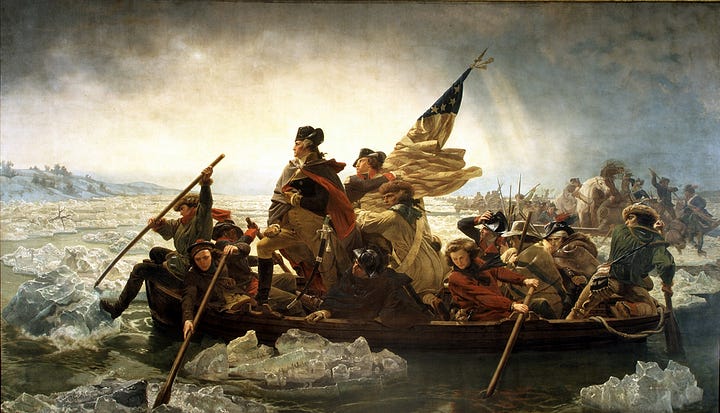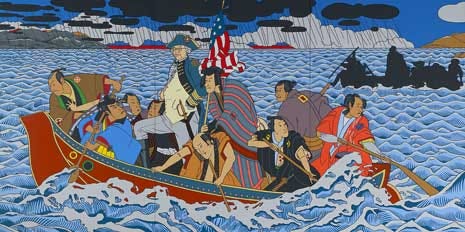Hi! My name is Anu Prabhala and I am a senior writer with the World Bank. I have spent my career in communications and publishing in the international non-profit sector. I believe the world is a small place and we are all way more alike than different. Let’s have fun together, muddling through this imperfectly perfect life.
Dear friends,
When our son was little, I used to read him a lovely children’s book called John Jensen Feels Different by Henrik Hovland.
It was about a bowtie wearing crocodile (smile) who felt different in society, to the extent that he tied up his tail one day—yikes—to fit in and had a nasty fall, landing up in the emergency room. There, he is seen by the elephant physician, Dr. Field, (who, minor detail, we refer to till today as Dr. Anthony, my son’s pediatrician) who seemed, lo and behold, very comfortable in his pachydermous skin, despite his comically large ears and nose. Dr. Field assured John Jensen that there were many benefits to having a long tail just as his large ears proved so useful to shut out noise during movies—tails were great for stopping the ball as a goalie, even steering a backstroke while swimming. John Jensen left the hospital changed, no longer feeling like a fish—well—a crocodile out of water, but a regular citizen who even proudly participated in the Norwegian Constitution Day on May 17th, proudly showing off his bowtie as well as a large bow on his tail.
“It's OK to be different”, was the book’s main message. But the story is also a simple and powerful affirmation on the power of perspective in our life. Merely shifting our view on an issue can make us change the way we think about life itself! And feel better in a snap of a finger!
John Jensen was the same person, literally, before and after the emergency room visit. But he left Dr. Field’s office with a changed perspective, and hence a changed citizen—one where he accepted what he thought were his shortcomings, as strengths. With this change in perspective, John Jensen felt stronger and happier.
John Jensen was not a prisoner of his own thinking, but he felt empowered by his new perspective.


The power of perspective in painting. The famous 1851 Emmanuel Luetze painting, Washington Crossing the Delaware to the left was painted in 2010 by American artist, Roger Shimomura, and in his vision, he infuses the traditional painting with Japanese art, while still keeping recognizable elements from the original.
It's all a matter of perspective. And changing our perspective may well be the cheapest medicine on the market.
A decade back, I developed some chronic health woes. Initially, I rebelled like John Jensen. I wanted, I later realized, the smooth sailing life of before where I was in control all the time. Life took a turn toward the better when I simply acknowledged that it’s here to stay and I’d simply have to accept and manage. Tools from my own Vedanta training helped me—most notably, being an observer or a sakshi looking at life outside-in, distancing myself from my Body, Mind, and Intellect, believing I was more than my thoughts, and truly cherishing the many blessings of life—my family and friends, travel, and writing.
I am still me, but the fundamental shift in my perspective made me stronger, happier, and empowered. I was not a prisoner of my own thinking, but felt empowered by my new perspective, which opened up a whole new dimension of choices.
In the Miracle of Mindfulness, Thitch Nhat Han, the late Vietnamese monk, recounts the story of brother Allen who felt torn apart not having enough time for himself between taking care of his young son Joey, his newborn Ana, helping his wife recuperate from childbirth, and do his own work. Thay (as Thitch Nhat Han was affectionately called) asked him, "ls family life easier than being a bachelor?"… A lot of people say that if you have a family you're less lonely and have more security. Is that true?" Here was brother Allen’s answer, an excerpt from the book:
Allen nodded his head and mumbled something softly. But I understood.
Then Allen said, "I've discovered a way to have a lot more time. In the past, I used to look at my time as if it were divided into several parts. One part I reserved for Joey, another part was for Sue, another part to help with Ana, another part for household work. The time left over I considered my own. I could read, write, do research, go for walks.
"But now I try not to divide time into parts anymore. I consider my time with Joey and Sue as my own time. When I help Joey with his homework, I try to find ways of seeing his time as my own time. I go through his lesson with him, sharing his presence and finding ways to be interested in what we do during that time. The time for him becomes my own time. The same with Sue.
The remarkable thing is that now I have unlimited time for myself!"
Allen was the same, but the shift in his perspective to seeing his time with the kids as “my time” made him a happier person. It’s a struggle all parents have, especially moms or single parents. I’ll admit, I stole Allen’s idea of creating unlimited time when I felt overwhelmed at it all—a career, raising kids, maintaining a good balance in health, having me time, not to mention pursuing travel and writing. I prioritized, changed my career path to one to of a consultant, really zoomed in on writing projects so I was doing what I liked most, and made a lot of what I took on with my son as an opportunity to fulfill my own interests. My son is in competitive quizzing, and we discovered a mutual love for exploring knowledge together, so a major portion of our life spent on preparing and traveling for competitions is “my time” and our family time as well. It’s never perfect, but the shift in perspective helped since it made way for more choices and more quality time spent together.
I believe two things are fundamental for seminal shifts in perspective.
First, a dogged desire to live well or a belief that our life is worth living to its fullest, despite it all. Of course, John Jensen could have continued to hate his tail and feel miserable. I could have wallowed in self-pity and frustration at my full-time job and health. And, brother Allen could have continued to raise kids fighting tooth and nail about the unfairness of not having much time in life for himself because Joey and Ana were taking up too much of his time. But what’s the point of living a life complaining all the time? Rather than fall into the misery hole, bumping up the desire to live a good life and enjoying our one shot in this universe is likely to yield better results.
Bottom line, we have to love ourselves and our life enough to understand we are worth it and seek that shift in perspective. Life is better dictated by a grander goal, a greater perspective than the situation or obstacle at hand pushing you into a corner. John Jensen wanted to fit into the society as someone who looks a bit different, I wanted to live my life to its hilt with no regrets, and brother Allen wanted to feel happy with life as a proud dad of two and a husband. That’s the bigger circle or perspective. And to get to get to that bigger circle, the obstacles at hand must not become the focus of our day-to-day life.
Second, a willingness to change. I have heard it over and over again, “Oh, I can’t do this because that’s just not me”. Or, “It’s not in my character to do this. I can’t change after all these years!”. Well, guess what, you can. Anyone can. Most importantly, you must. If only to honor yourself. And to feel better in life.
There is a beautiful verse in the Bhagavad Geeta (chapter 3, verse 28) addressing why we must change in life according to circumstances:
tattva-vit tu mahā-bāho guṇa-karma-vibhāgayoḥ
guṇā guṇeṣhu vartanta iti matvā na sajjate
Addressing Arjuna, the warrior prince, who at the onset of the Geeta is unwilling to fight the battle called life, as mahā-bāho or the “mighty-armed”, Lord Krishna implies that a true hero is not one who can face an army and kill a few, but one who can save himself. A true warrior is one who can tirelessly fight in the inner world and gain victory over his own mind and attachments.
So, if something is not working in life, we essentially need an internal rewiring, to fight it and better it. Our commitment to change, we owe it foremost to ourselves! And we do this by following the path of karma yoga or the path of action. The Geeta explains that from birth to death, we must act, and by doing so, we discover knowledge and wisdom through our own actions. Further, we discover how much we are capable of, and how perfect our own Self is, as our chief advisor. If we do our karma or our work, our perspective, informed by the knowledge and wisdom we accumulate doing our work, is bound to shift toward the better. See my post on Voltaire’s Candide, examining the protagonist, Candide, in the light of karma (work) yoga and gyana (wisdom) yoga.
So, let’s not stay prisoner of our own thinking, but let’s be empowered by shifting our perspective in life ever so often. That is our karma or our work, and that’s how we gain gyana or knowledge in life.
More power to perspective! Do you agree?
Meaningfully yours,
Anu Prabhala







This was both interesting and very well written, Anu!
This was such a good read- it hit my inbox exactly at the time I needed it.
We owe it to ourselves to change and look at situations with a different view. I have to constantly remind myself to evolve and grow.
Thanks for penning this down so beautifully! ✨